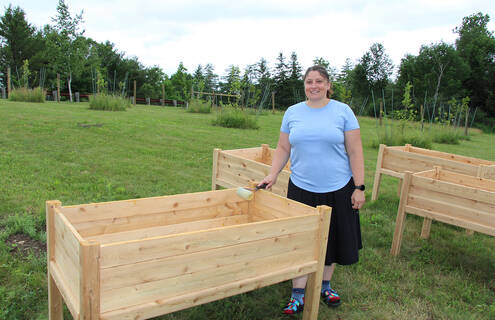
“Oh! There’s a woodchuck! We’ve been trying to find him!” exclaims Taralyn Bielaski, MPH, Community Health Partnership Coordinator for Regional Community Health, as she spots a brown furry trespasser at the corner of the fence.
Bielaski is working at the Farmacy Garden located on the far side of Parking Lot 20 near Mt. Support Road on the Dartmouth Hitchcock Medical Center (DHMC) campus. Bielaski is at the garden several times a week, where she works in partnership with Willing Hands, one of the most successful hunger relief and food recovery organizations in New England.
Willing Hands
Located in Norwich, Vermont, Willing Hands provides expertise on soil, plantings and harvesting, and manages the garden’s volunteer workforce. Dartmouth Health’s Population Health team provides the garden space and staff, and it helps recruit volunteers to help make the project successful.
The garden was started in 2019 by Chelsey Canavan, MSPH, Manager of Dartmouth Health’s Center for Advancing Rural Health Equity, in collaboration with Willing Hands and DHMC’s Facilities team.
The harvest
“The harvest goes directly into the hands of community members,” Bieleski explains. All food grown in the garden is distributed by Willing Hands to over 80 partner organizations throughout the greater Upper Valley region.
Canavan and Bieleski also help to get healthy foods to patients through various food and nutrition support programs, including Dartmouth Cancer Center, DHMC’s Moms in Recovery program for pregnant and parenting people, multiple clinical departments at DHMC and the Women’s Health Resource Center, a community service offering preventive care and resources.
In total, The Farmacy Garden grows around 1,200 pounds of produce every year.
Other partnerships include outreach with Sweetland Farm in Norwich, the Dartmouth Organic Farm and the Upper Valley Haven. There is also a Dartmouth Health Food Champions group that meets quarterly to discuss various food and nutrition security initiatives across the system.
A garden for the future
In the garden, Bielaski has built planters to hold flowers and is completing a terrace area for picnic tables.
Much of the work in the garden has been supported by a $40,000 award from the Hitchcock Foundation’s Helmut Schumann Fellowship program.
One of the newest projects is a pollinator garden to increase vegetable productivity, made possible by a $10,000 grant from the US Department of Agriculture.
“We’re trying to feed people, and give them healthier options,” Bielaski says. “Food insecurity impacts a lot more people than you realize. It can impact anybody.”
Read more about the Center for Advancing Rural Health Equity and how it’s building strong relationships for the health of our rural communities.
This article first ran under the title of “Growing for Good” in the July 2024 Issue of Connections Magazine.